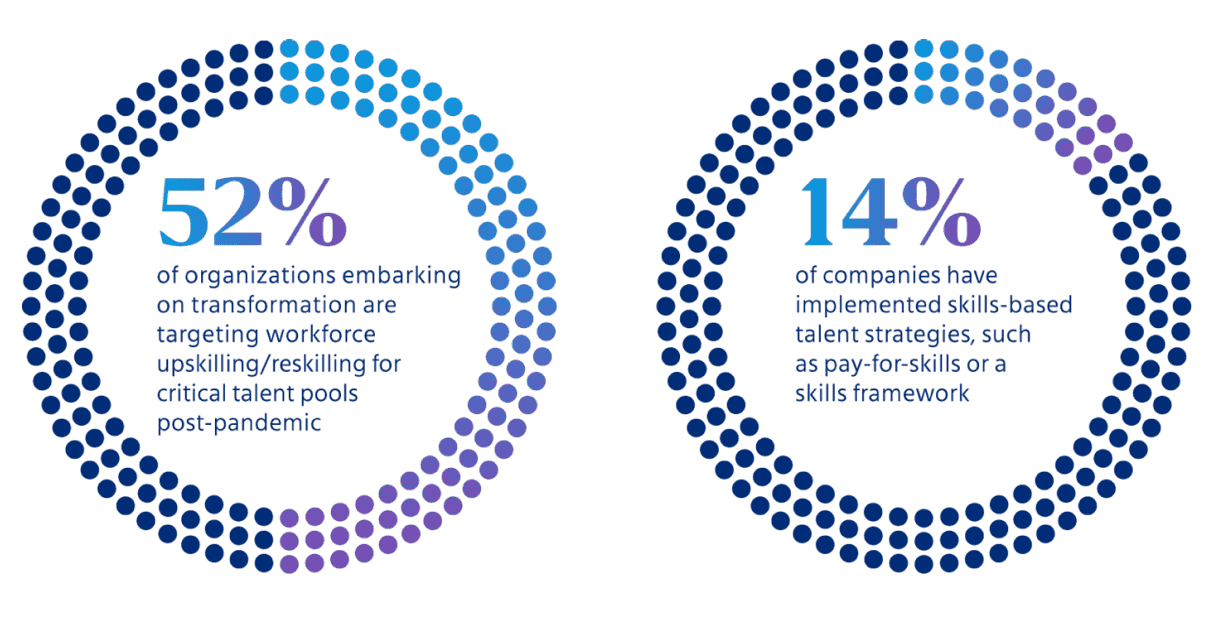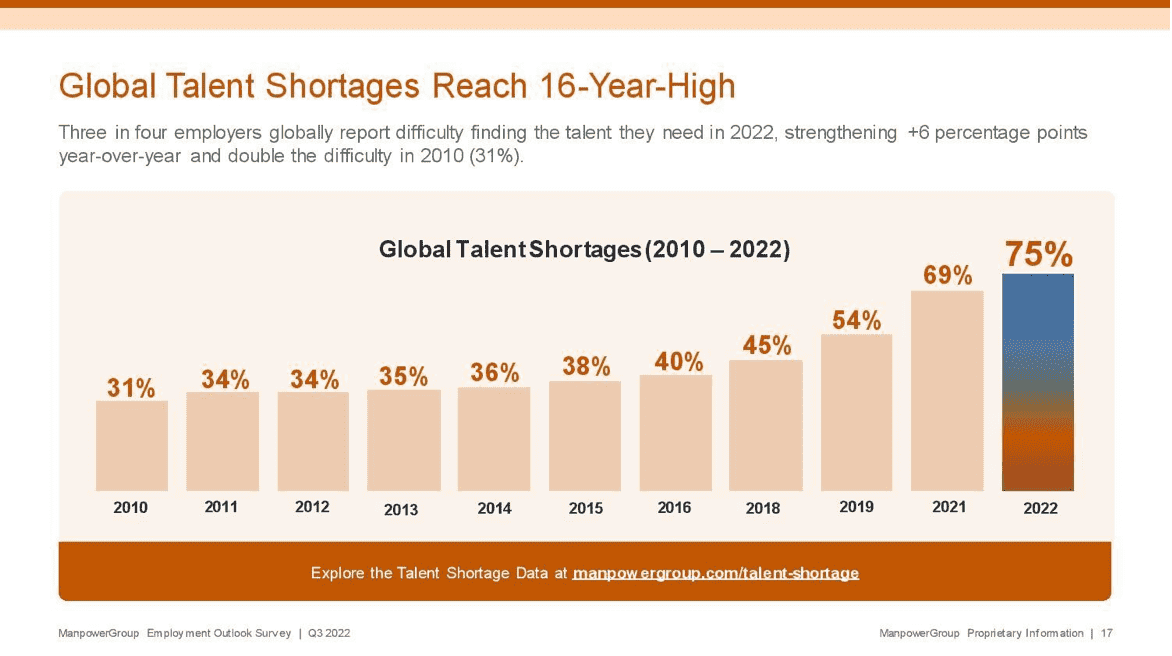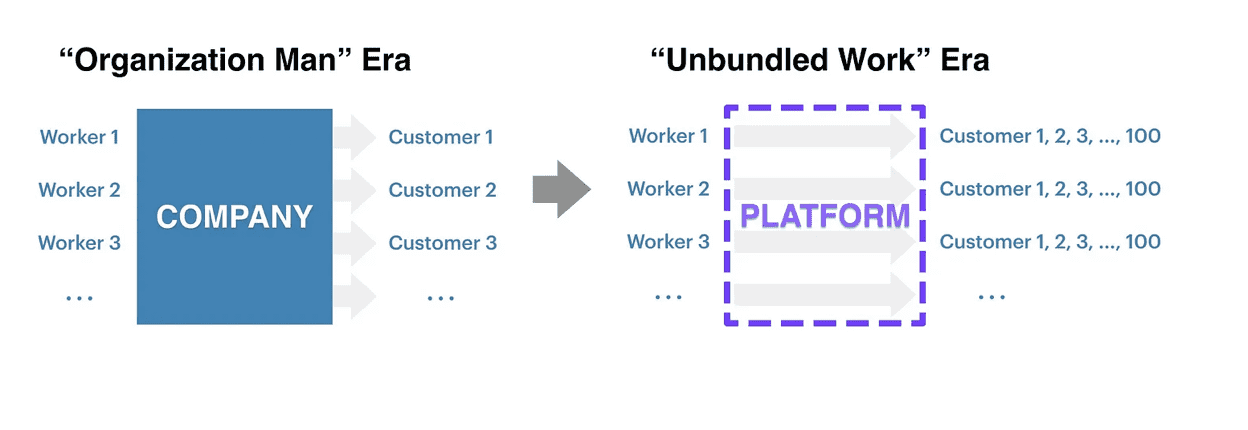-
There is transformation happening in the world of work, both as a result of the pandemic, and underlying structural shifts.
-
Companies are restructuring for efficiency, and recruiting for skills rather than potential, while talent is highly mobile.
-
Digital skills are increasingly central to workers’ employability.
From the phenomenon of “quiet quitting” to the great resignation, the post-pandemic reluctance of workers to return for the office has been well documented. There are other changes happening as a result of the subsequent economic slowdown: employment offers have been rescinded amidst layoffs in technology companies often seen as beacons of growth, and a STEM skills shortage has led to calls for upskilling and re-skilling programmes in the workplace and a global scramble for talent. But many of the trends we are currently seeing in the world of work predate the COVID-19 pandemic. Here are five shifts that look set to endure:
1. Restructuring Companies for Efficiency
Changes to industry structures and disruptions to business models have encouraged companies to restructure for relevance and competitiveness. Companies such as General Electric have split while others have responded with mergers, as in the case of Tata Group. Holding companies that have been able to do without job cuts, like Alphabet, are calling for an increase in employee productivity.
Despite capital flow to many emerging markets, several industries remain informal, fragmented, and dominated by Small and Medium Enterprises (SMEs), which create 7 out of 10 jobs. Irrespective of the market, industry and approach, the pursuit of efficiency in companies prioritise retention and hiring of employees with skills and competencies that contribute directly to the bottom line.
2. A shift to Skills-Based Hiring
Faced with the need to deliver short to medium-term results, companies are increasingly hiring for skills backed with experience, and less for potential. This has led to a decline in graduate recruitment. Many employers are eliminating degrees from their hiring criteria in favour of skills assessment. Only 11% of business leaders “strongly agree” that students are graduating from higher education with the necessary competencies. This has led to calls for higher education reform.
Young people entering the world of work have to embrace work-integrated learning opportunities available as internships, placements, and apprenticeship programmes to provide relevant experience in developing their skills. More than four in five employers believe internships can prepare graduates to succeed in their companies.

3. The Mobility of Talent
The global war for skilled talent has led to massive opportunities for some workers to move across jobs, industries and countries. The normalization of remote work accelerated by the COVID-19 pandemic and powered by digital technologies for collaboration has made it possible for top talent to glide across jobs or be in multiple jobs at a time. Research predicts that today’s youngest workers will hold twelve to fifteen jobs in their lifetime.
Therefore, individuals and companies must evaluate their work opportunities from a broader and global lens, shifting to a mindset of career mobility and the development of transferable skills for a lifetime of numerous job opportunities. At the same time, the future looks likely to hold higher trade tariffs and tighter border controls, and we have yet to see what this means for worker mobility.

4. The Rise of ‘Work’ and the Decline of ‘Employment’
The rise of platform companies has fundamentally changed the rules of employment. Companies such as Uber have created work opportunities for around 5 million drivers worldwide without signing a single driver employment contract. The gig economy has opened up opportunities for individuals and companies to access a diverse and global pool of talents to get tasks done on demand – as well as undermining many of the structures that have underpinned employment security.
This has changed how organizations approach recruitment, with a move away from human resources departments managing employees, and towards talent strategy teams exploring how to meet human resources needs. Analytic tools to measure performance enable a holistic view of talent management in the workplace. Job seekers in companies in regions most affected by high unemployment rates must broaden their horizons beyond a search for employment opportunities to exploring work opportunities. Regulators in industries dominated by platform companies need to push for benefits to be tied to work opportunities, not just employment, to protect the interest of workers.

5. The Central Importance of Digital Skills
The digital transformation of industries has brought about massive shifts in the world of work. Organizations across all sectors, from agribusiness, finance and manufacturing to media, are evolving into technology companies. In this context, ’employability’ is not just about ‘soft skills’ such as communication, collaboration, critical thinking and emotional intelligence. As digital platforms in AI applications, robotics, and the Internet of Things make inroads into the workplace, employability skills will be increasingly centred around using these digital technologies at work.
The article was first published here
Photo by Matt Hoffman on Unsplash.

 5.0
5.0 





















